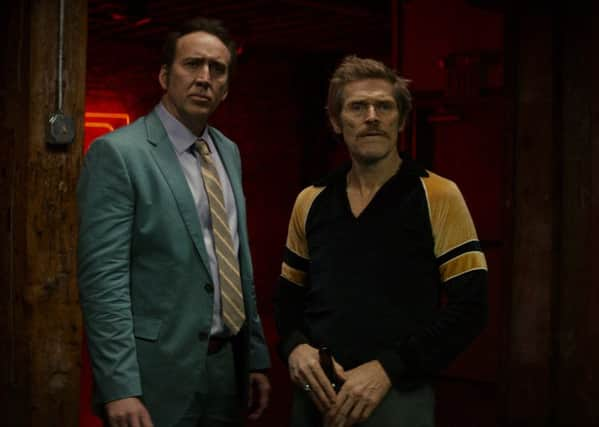Film reviews: Dog Eat Dog | Indignation | Your Name


Dog Eat Dog (18) **
Indignation (15) ****
Your Name (12A) ****
With Dog Eat Dog, Paul Schrader may accidentally have made the perfect movie for the dawning Trump era. That’s not to say this low-budget crime movie starring Nicholas Cage and Willem Dafoe is any good. It’s merely to point out that the way it gleefully embraces the violent, racist and misogynistic impulses of its ageing white male protagonists in post-recession America makes it feel sickeningly apropos.
Cage plays ex-con Troy. Newly released from prison after a 20-year stretch he finds himself adrift in a world he no longer understands, a world in which guys like him are no longer automatically entitled to a slice of the economic pie. Looking to earn some quick cash for him and his crew – the psychotically insecure Mad Dog (Dafoe) and the marginally more in control Diesel (Christopher Matthew Cooke) – he comes up with a plan to shake down a local drug dealer by pretending to be the police. When this blatantly racist scheme goes south, his mafia contact (wheezily played by Schrader) feeds him a more lucrative kidnapping job that requires them to snatch a rival gangster’s baby.
Advertisement
Hide AdThough this plot twist can’t help but bring to mind Cage’s break-out role in Raising Arizona, too often Dog Eat Dog simply revels in its low-rent setting. In scene after scene the camera leers over the strippers and prostitutes with whom Troy and co fraternise, and it lingers uncomfortably on the female characters who find themselves threatened, punched, knifed or shot simply because they’ve drifted into the orbit of a bunch of knuckle-draggers whose impotent rage at a world that has progressed beyond their evolutionary capabilities has made them unpredictable and dangerous.
It’s all deeply unpleasant to watch. Though Schrader’s rightly celebrated script for Martin Scorsese’s Taxi Driver offered a profound study of white male alienation in politically troubling times, here he offers no such intellectual balm. An opening talk-show debate about America’s right to bear arms may hint at some kind of satirical exposé of a country hell-bent on destroying itself simply because armed insurrection is hardwired into its DNA, but Schrader follows it immediately with a garish, filmed-for-laughs double homicide ironically scored to rockabilly classic Woo-Hoo – an unappetising taster for the sub-Tarantino mess that follows.
Indeed Schrader’s entire approach to the source novel by Eddie Bunker (the ex-con crime writer who achieved cult fame as Mr Blue in Reservoir Dogs) makes it seem as if he’s only just stumbled across the 1990s. Not only does his collage-like mix of film stocks and techniques echo the intentionally chaotic, free-form ADHD style of Oliver Stone’s Natural Born Killers, he also has characters embark on irrelevant pop culture digressions about Humphrey Bogart and, bizarrely, Elliot Smith, whose violent suicide is invoked by a character as she listens to something that patently isn’t Elliot Smith (perhaps we should be thankful that Schrader clearly wasn’t able to secure the rights to his songs, thus saving him from further desecration).
Through it all Nicolas Cage occupies that default space between somnambulism and psychosis that has characterised so much of his late-period work. Dafoe, meanwhile, commits to out-twitching him as the whiny, wearisome Mad Dog. Together they put the “id” in idiot, reflecting the devolved cartoon mindset of a dangerous breed that wants what
it wants, everyone else be
damned.
After Ewan McGregor’s intellectually challenged adaptation of American Pastoral, it’s something of a relief to be in the surer hands of James Schamus – Ang Lee’s regular screenwriter and producing partner – for this year’s other Philip Roth adaptation. Based on Roth’s 2008 novel about a young Jewish intellectual in 1950s America, Indignation casts Logan Lerman as the righteous Marcus, whose atheism and fiercely independent nature immediately bring him into conflict with the students and faculty members of the prestigious college to which he’s won both a scholarship and a stay-of-execution at a time when other young men his age are being sent to fight in Korea.
Having lost neighbourhood friends in the conflict already, Marcus is constantly reminded of the fact that even small mistakes can have serious consequences and the film uses this to subtly explore whether an emphasis on conformity cultivates a fatalistic psyche by forcing us to deny our most basic yearnings. In Marcus’s case, these take the form of Olivia, the sexually forthright student he finds himself obsessing over. Olivia is soon revealed to be another of Roth’s mad women, but Schamus is at least sensitive to this trope and strives to make her a fully-rounded character. He’s aided by Sarah Gadon, who plays her with an undercurrent of vulnerability that’s just subtle enough for it to go unnoticed by the bullish, self-aggrandising Marcus, who is himself all too ready to spar on an intellectual level with the college dean (a magnificent Tracy Letts), but not at all ready to fight for what his heart craves.
Advertisement
Hide AdA massive hit in its native Japan, Your Name exploits anime’s limitless potential to tell a poignant love story that incorporates gender identity and cosmic wormholes to dazzling narrative effect. Though Donnie Darko crossed with Freaky Friday would be the easy – if not exactly commercially appealing – reference points for this tale of a teenage boy called Taki who wakes up in the body of a teenage girl called Mitsuha (and vice versa), the way the subsequent film unfolds – its protagonists leaving messages for each other on their iPhones, their dreamlike interactions changing their fates forever – ensures it’s much deeper and darker than its bright, breezy, montage-heavy first half
suggests. ■